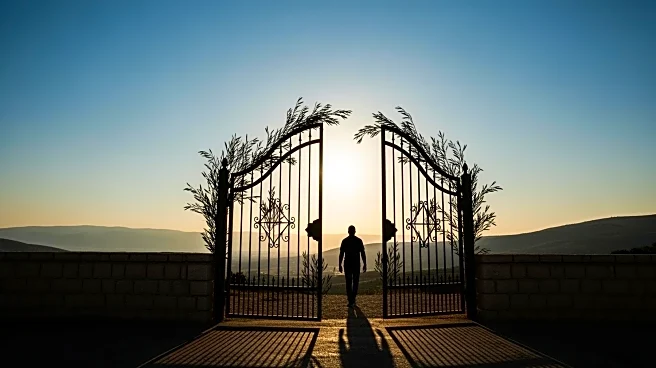What's Happening?
Hamas has declared that it has returned all Israeli hostages it can recover, both living and deceased. This announcement implies that the remains of nearly two dozen individuals may never be repatriated.
The statement was reported by BBC News' Barbara Plett Usher, highlighting the ongoing complexities and emotional toll of hostage situations in conflict zones. The return of hostages, particularly those who are deceased, underscores the challenges faced by families seeking closure and the broader implications for diplomatic relations between Israel and Hamas.
Why It's Important?
The return of hostages by Hamas is significant as it affects diplomatic relations and humanitarian efforts in the region. For the families of the hostages, this announcement brings a mix of relief and grief, as they may receive closure but also face the reality of loss. The situation highlights the ongoing tensions and humanitarian challenges in the Israeli-Palestinian conflict. It may influence future negotiations and peace efforts, as the handling of hostages often plays a critical role in diplomatic discussions. The broader impact on regional stability and international relations remains a key concern.
What's Next?
The announcement may lead to increased diplomatic efforts to address the remaining issues related to hostages and conflict resolution. Israeli authorities and international organizations might intensify their efforts to recover any remaining hostages and address the humanitarian needs of affected families. The situation could prompt discussions on improving protocols for hostage recovery and negotiations in conflict zones. Additionally, there may be calls for accountability and transparency in the handling of such sensitive matters, potentially influencing future peace talks and agreements.
Beyond the Headlines
The ethical and legal dimensions of hostage situations are complex, involving considerations of international law, human rights, and the responsibilities of conflicting parties. The return of hostages, especially deceased individuals, raises questions about the treatment of prisoners and the obligations of groups like Hamas under international humanitarian law. This development may also impact cultural perceptions and narratives surrounding the conflict, influencing public opinion and media coverage.









